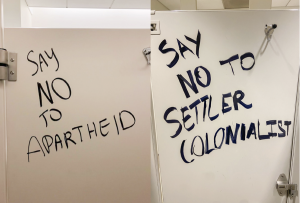Community Awareness, Activism and Change
May 12, 2008
Offering its first class in 1987, the Asian American Studies Program grew from the need to educate UMass students about the Asian American experience. Initial advocacy from Asian American community leaders and support from campus Vietnam Veterans helped to create a unique medium for awareness with the program driven by engaging members of the community, especially those who closely relate to the refugee experience.
Director of the Asian American Studies Program, Peter Kiang, explains that “UMass Boston, is the perfect location which provides access to the population it serves”. Located in Dorchester, a community with a high concentration of Vietnamese, UMass Boston provides a relatively affordable education. Humbly holding Harvard credentials, he describes the advantages UMass students have over any other schools in the North East, including Harvard, MIT, and BU. These schools do not have a department or program comparable to UMass; none provide as many classes, and many universities do not offer Asian American Studies at all.
Some topics Kiang and other faculty bring to the classroom include immigration, labor, community settlement, US-Asia relations, gender and family dynamics, and race relation paradigms. In viewing media, for example, he encourages students to ask questions such as; who made it? Who provided funding? Who is the audience? When was it created? What else needs to be created? With an emphasis on learning and not testing, he and other faculty challenge students not only to share what they understand, but to be the change in their reality by applying their connections through projects, participation, and production.
Complementing the university’ Institute for Asian American Studies (IAAS), the Asian American Studies Program offers the courses and curriculum to students, while the Institute focuses on research. The Asian American Studies Program also works in conjunction with other organizations that reach out to the community like the Coalition for Asian Pacific American Youth, which works to develop leadership skills through empowering community youths. In addition, because the Asian American Studies Program is not only interdisciplinary but inter-collegiate, it collaborates with many departments and centers as well as faculty and students in every college of the campus.
To get a better idea of how students have benefited from Asian American Studies, I interviewed three students taking Asian American Studies class, Asians in America. To understand where their opinion is coming from, I will present their story and then their thoughts on the class.
In a quest of understanding one’s self, Iria is on a yearlong journey attending Asian American Studies classes. Iria is a German international student, taking part in the exchange program between the University of Massachusetts and the universities in the two federal states of Germany, Hessen and Baden-Württemberg. Though she double majors in Business Administration and English Literature at Mannheim University, Germany, she longs to understand her Asian identity better and, thus, was happy to be able to attend Asian American Studies classes.
Iria identifies herself as a biracial, part Indonesian, and part German. She recalls the moment when her mother explained this identity to her and her brothers, using the German word “Mischling.” The English translation literally means “mixed person.” At an early stage, she was aware of her biracial circumstance. Her childhood in Indonesian, she connected to the various flavors and cuisine of Indonesia. At the age of four and a half her parents moved to Germany due to her mother’s state of health. Longing for the comforts of Indonesia, she recalls asking her mother when they would be going “back home.”
Growing up in Germany, she could integrate but still often had the feeling of not belonging there a hundred percent. She knew she was different and could not relate nor develop her understanding of biracial identity with her German friends. Her house filled with the aromas of Indonesia, her friends would often ridicule her for enjoying dishes such as Nasi Goreng. Not the “typical blond hair, blue eyed German,” questions of “what are you?” or “where are you from?” would start to somewhat annoy her or let her realize that she still did not fully belong to the German society, although she has spent most of her life there. She understood what it was to be German but did not have the voice to define what it is to be “German” in her experience. Having to face up explaining her identity again and again drove her to understand what it truly is to be German and Indonesian.
Not having an access to better defining her identity, she longed to travel the world. After her trip back to Indonesia, her craving to attain more knowledge of her Indonesian culture grew. Though her Bahasa Indonesia (the official language of Indonesia) was more than a bit rusty, she was able to connect with her family through food. Her German mother reinforced this appreciation through the delight of the mere mention of Indonesian cuisine. She states that her mother would most look forward to going back to Indonesia for its unique flavors not very common in Germany.
Yearning to understand, she traveled great distances just to take classes at UMass Boston. She recalls searching for a university that offered Asian American studies and the impressive extensive curriculum offered at UMass Boston sealed her application. A year later she found herself enjoying the interactive classes, where others including her, share in the experiences of the Asian identity. The unconventional nature of the classes allows her to learn about Asian American history, while solidifying her definition of self-identity.
Hailing from Jamaica, Karland recalls moving to Boston at the age of seven. His parents holding traditional Jamaican values instilled in Karland the importance of respect and education. With books and knowledge, his parents sheltered him from the troubles of the inner city youth. Creating a standard of valuing education, Karland is a sophomore in the Honors program. He is an active member of the Iota-Phi-Theta Fraternity and the Students Veterans Coordinator. As a United States Marine, he notes the importance of serving his country as well as taking advantage of it’s freedom and opportunity.
Holding Jamaican values and immersed in the American culture, Karland identifies as a Jamaican American. He notes the importance of “being one’s self” to avoid complete assimilation.
Through his interest of Asian cultures and with advice of Rajini Srikanth of the Honors Department, he found a fountain of knowledge in the Asians in America class. The Asian in America class satisfied his craving for knowledge and fulfilled his graduation requirements. Though Karland had prior knowledge of the history of Asian in America, the class brings him more understanding and shines some light on the dynamics that allowed for the racial discrimination of Asians in America. The class allows him to make connections with race, gender, identity, and the American context.
Karlend understands the value of an education and emphasizes “we are in school to learn, so don’t be afraid to take the opportunity to expand your horizon”
Born of refugee parents, Judy grew up as an active member of the community. Achieving an excellent academic status Judy chooses a path, as she says, that allows for “community activism”.
Throughout high school she participated in community based
organizations. One particular organization that helped her find the Asian American Studies is Coalition for Asian Pacific American Youth (CAPAY) located in UMass Boston.
She now attends classes at UMass Boston, not for credit but to connect to her Asian American experience. The classes offer an outlet for her to make connections with the other students who share her experience and sentiments. She enjoys how the class is relevant to her reality. Judy appreciates how the faculty and staff of the Asian American Studies apply their knowledge and are active in the community.
Well, it is nearing the end of the semester. As for myself, I will complete Peter’s class next week. Although his class deals with themes such as immigration, labor, community settlement, US-Asia relations, gender and family dynamics, and race relation paradigms, the idea that will remain with me is that society can define your reality. But knowledge is power when one has the ability to redefine their environment.










































































